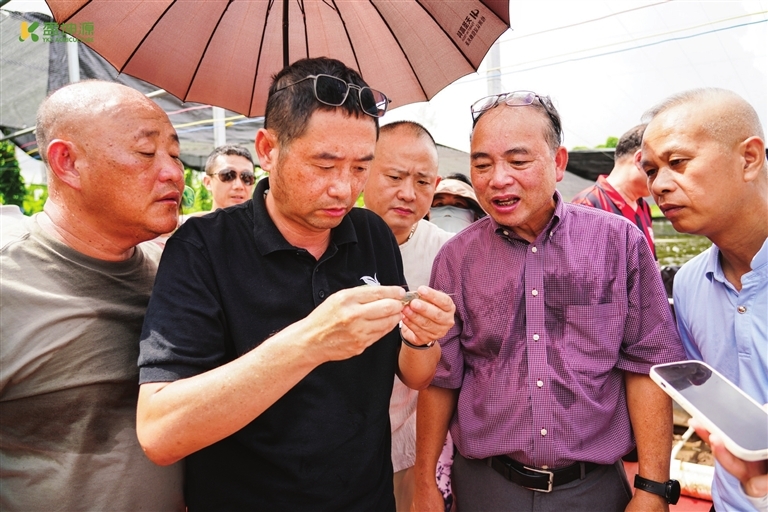
Wei-wen Cai (2nd Right) communicates with industry professionals.
The last two days of July saw a harvest for Yingkunyuan Aquaculture Base in Zhongshan's Banfu Town. The pond with 200,000 South America white shrimp seeds yielded 4,500 kilograms per mu.
This is the outcome of an experiment conducted by Wei-wen Cai, a PhD in biomolecular chemistry at New York University and one of the first scientists involved in the Human Genome Project. He and his team applied the technologies of genetic analysis and micro-ecological control to the breeding of Pacific white shrimps and planned to extend the practice to more species.
Cai studied chemistry at Sun Yat-sen University in the 1980s, and worked as a chemistry teacher at the South China University of Technology after obtained a master's degree. In early 1991, he was awarded a scholarship by New York University to study for a doctorate. In 1996, he joined the Department of Molecular and Human Genetics at Baylor College of Medicine for postdoctoral research.
In 2014, Cai returned to China with his technological achievements and entrepreneurial experience to start his own business, and participated in Zhongshan's annual investment promotion conference. In late 2014, Zhongshan Halgen Gene Technology Co was founded, and he was the chief scientist and chairman of the company. Halgen also signed a settlement agreement with the Zhongshan municipal government and the National Health Technology Park.
Over the years, Cai worked in the fields, and he founded the Yingkunyuan eco-agriculture technology company in Zhongshan in late 2022. With the technologies of genetic analysis and micro-ecological control, he hoped to find new development paths for other aquaculture products, such as crisp grass carp and mandarin fish, and bring more benefits to farmers.
Police Registration Number: 44200002442868
Website ID: 4420000052
Sponsored by: Office of Zhongshan Municipal People's Government
Technical Support: Information Center of Zhongshan
Without written authorization from Zhongshan Municipal People’s Government, the content of the site shall not be republished or used in any form.
About Us | Site Map| Privacy Statement| Contact us
